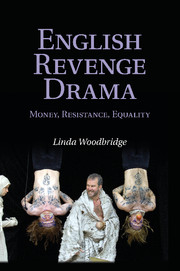Book contents
- Frontmatter
- Contents
- List of figures
- Acknowledgments
- English revenge plays discussed in this book
- Standard MLA abbreviations for Shakespeare's plays
- Note on the text
- PART I RAMPANT REVENGE
- PART II ECONOMIC UNFAIRNESS: REVENGE AND MONEY
- PART III POLITICAL UNFAIRNESS: REVENGE AND RESISTANCE
- 6 “A special inward commandment”: the mid sixteenth century
- 7 Resistance in the golden age of revenge plays
- 8 Revenge and regicide: the Civil War era
- PART IV SOCIAL UNFAIRNESS: VENGEANCE AND EQUALITY
- Conclusion
- Bibliography
- Index
7 - Resistance in the golden age of revenge plays
Published online by Cambridge University Press: 06 December 2010
- Frontmatter
- Contents
- List of figures
- Acknowledgments
- English revenge plays discussed in this book
- Standard MLA abbreviations for Shakespeare's plays
- Note on the text
- PART I RAMPANT REVENGE
- PART II ECONOMIC UNFAIRNESS: REVENGE AND MONEY
- PART III POLITICAL UNFAIRNESS: REVENGE AND RESISTANCE
- 6 “A special inward commandment”: the mid sixteenth century
- 7 Resistance in the golden age of revenge plays
- 8 Revenge and regicide: the Civil War era
- PART IV SOCIAL UNFAIRNESS: VENGEANCE AND EQUALITY
- Conclusion
- Bibliography
- Index
Summary
Methinks their ghosts come gaping for revenge,
Whom I have slain in reaching for a crown.
Clarence complains, and crieth for revenge.
My nephew's blood, “Revenge, revenge,” doth cry.
The headless peers come pressing for revenge.
And every one cries, “Let the tyrant die.”
The True Tragedy of Richard IIIGood, excellent revenge, and pleasant!
The CardinalThere is no point denying that England's golden age of revenge drama – the 1580s through the Jacobean decades – luxuriated in sensationalism. Hieronimo stabs a duke with a penknife and bites out his own tongue. The Jew of Malta poisons a nunnery, dynamites an army, and plunges to his death into a cauldron of boiling oil. Titus Andronicus rejoices in rapes, dismemberments, insanity, cannibalism. Antonio's Revenge features a dismembered child. The Revenger's Tragedy's hero talks to a skull, and poison eats away an evil duke's lips. In The Atheist's Tragedy, a duke tries to rape his daughter-in-law in a graveyard and accidentally brains himself while striving to behead innocent subjects. In The Revenge of Bussy, five ghosts dance to celebrate vengeance. Hamlet and Women Beware Women end like grand operas of spectacular death. Renaissance audiences loved sensational gore. Modern audiences love sensational gore. But no one would reduce, say, Hamlet to the titillation of violence. And much more transpires in other revenge plays too.
- Type
- Chapter
- Information
- English Revenge DramaMoney, Resistance, Equality, pp. 167 - 188Publisher: Cambridge University PressPrint publication year: 2010



